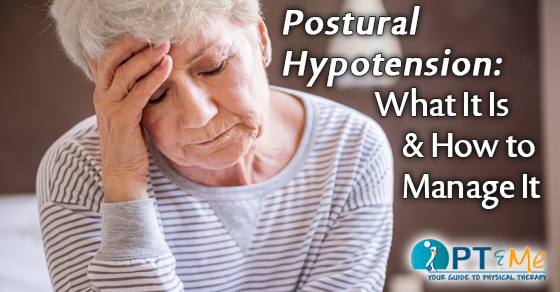
Postural hypotension (or orthostatic hypotension) is when your blood pressure drops when you go from lying down to sitting up or from sitting to standing. When your blood pressure drops, less blood can go to your organs and muscles. This can make you likely to fall.
What are the symptoms?
Although many people with postural hypotension have no symptoms, others do. These symptoms can differ from person to person and may include:
- Dizziness or lightheadedness
- Feeling about to faint, passing out or falling
- Headaches, blurry or tunnel vision
- Feeling vague or muddled
- Feeling pressure across the back of your shoulders or neck
- Feeling nauseous or hot and clammy
- Weakness or fatigue
When do symptoms tend to happen?
When standing or sitting up suddenly
- In the morning when blood pressure is naturally lower
- After a large meal or alcohol
- During exercise
- When straining on the toilet
- When you are ill
- If you become anxious or panicky

What causes postural hypotension?
Postural hypotension may be caused by or linked to:
- High blood pressure
- Diabetes, heart failure, atherosclerosis or hardening of the arteries
- Taking some diuretics, antidepressants or medicines to lower blood pressure
- Neurological conditions like Parkinson’s disease and some types of dementia
- Dehydration
- Vitamin B12 deficiency or anemia
- Alcoholism
- Prolonged bed rest
What can I do to manage my postural hypotension?
- Tell your healthcare provider about any symptoms
- Ask if any of your medicines should be reduced or stopped
- Get out of bed slowly. First sit up, then sit on the side of the bed, then stand up
- Take your time when changing position, such as when getting up from a chair
- Try to sit down when washing, showering, dressing or working in the kitchen
- Exercise gently before getting up (move your feet up and down and clench and unclench your hands) or after standing (march in place)
- Make sure you have something to hold onto when you stand up
- Do not walk if you feel dizzy
- Drink 6-8 glasses of water or low-calorie drinks each day, unless you have been told to limit your fluid intake
- Avoid taking very hot baths or showers
- Try sleeping with extra pillows to raise your head
This information was written by Proactive Physical Therapy, an outpatient physical therapy clinic in Sioux Falls, South Dakota. At ProActive Physical Therapy, their number one priority is the patient. They strive to provide individualized treatment with hands-on, compassionate care. They do not rush their patients or their clinicians. Rather, they perform comprehensive evaluations and encourage patient input for treatment planning and goal setting. For more information click here.
